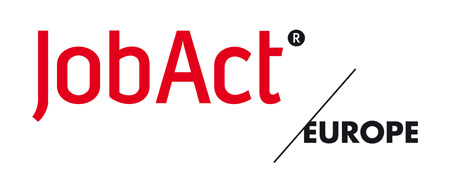JobActEurope – social inclusion through social arts
Research area Labour policy and health | Kerstin Guhlemann | Gudrun Brieden
JobAct Europe combines theater pedagogy with social work and allows the improvement of the social situation and the labour market opportunities of disadvantaged groups in society.

European Union - Erasmus+ Strategic Partnerships in Adult Education
JobAct Europe establishes a new form of education and social work - we call it social art. Social art combines classical areas of social work with creative techniques developed in theater and drama. Social arts is a further development of JobAct, which has been developed by the lead partner Projektfabrik Witten over the last twelve years. In social arts, the artists' materials are not canvases, marble or stages, but social issues. The underlying belief is that the art of the future will be social and that we need to develop an artistic approach to address contemporary social issues. The social artist will use an artistic approach and methodology to address these issues. Creativity, imagination and inspiration are the most important skills of the social artist to overcome obstacles.
Based on their shared experiences, the partners will work together to develop a general approach to social inclusion for four different target groups in need. Working groups for each of the four social issues, each led by a partner with specific experience in this regard (e.g. entrepreneurial training for migrants), will develop solutions for the social inclusion of the target groups concerned. Thus, in the end, new project formats will be developed to support socially excluded groups in need. In the project development of the new formats, great importance is attached to the transferability and "trainability" of the new approaches. One-week train-the-trainer courses will be developed to teach the new methodology to educators and theater practitioners. Four teaching and training activities will be conducted during this project, one for each social theme.
The project consortium aims to implement the new formats in the daily operations of the partners, thus scaling the new approaches to social work in all four countries. The project consortium seeks to implement the new formats in the daily operations of the partners, thus scaling up the new social work approaches to all four countries. Pilot projects will be launched based on the trainings. Based on the combination of social work and theater training, the participants of the pilot projects will be empowered, equipped with the skills and competencies they lack and supported to find their way (back) into the labor market.
A toolset will be developed that summarizes the new social art approach, provides strategies and methods for the four target groups, addresses social artist qualifications and frameworks, and creates a best practices collection across the four target groups. Potential funding strategies are included because their development is a crucial step for the successful dissemination of the new approach at the European level. The selection of partners varies according to the size and scope of the organizations and the partners' fields of experience in theater and drama, social work, management consulting and innovation management, fundraising and project management, entrepreneurship, and academia. Each partner brings a particular expertise to the goal of developing sustainable and realistic new approaches to social inclusion for disadvantaged groups.
The main outputs of the project are the toolset for trainers to run social art projects with different target groups, multipliers to engage with the principle and its fields of application, and a European network connecting organizations and stakeholders with the vision to make art an educational principle for Europe. Through the project, individual job opportunities for disadvantaged groups will be demonstrably improved and institutions working with these groups will have the opportunity to add an effective, innovative approach to their curricula. By providing a toolkit for adapting the approach to individual purposes, the educational principle can be applied in various fields of action.
- Projektfabrik gGmbH Germany
- TECHNICAL UNIVERSITY OF DORTMUND Germany
- VIVAIO PER L'INTRAPRENDENZA Associazione Promozione Sociale Italy
- Patchanka Società Cooperativa Sociale Italy
- CUTS Cabinet Ursula Teubert Solutions France
- Fondation d'Auteuil France
- Periszkop Egyesulet Hungary
- Szubjektív Értékek Alapítvány Hungary
The aim of the project is to develop new training opportunities for disadvantaged people. The project is tailored to improve the opportunities of various disadvantaged groups (NEET) of all ages with multiple barriers to integration, most of which lead to longer-term exclusion from the labor market. Employability is one of the five core objectives integrated in the Europe 2020 strategy. To promote social inclusion and employment, policy makers have focused on increasing employment for vulnerable groups, especially young people, migrants, refugees and people not in education or employment (NEET). The project promotes social inclusion and employability of individual participants with a holistic approach: the theater method significantly improves participants' Lisbon key competencies, namely communication in the local language, learning to learn, interpersonal, intercultural and social skills, initiative and entrepreneurship, and cultural awareness and expression. Self-esteem is significantly enhanced through a successful public premiere. Key skills are developed through a combination of personal development and social interaction. Especially in European countries with economic problems, high youth unemployment and a tight labor market situation, there is a growing gap between privileged and disadvantaged groups who are often left behind. By focusing on disadvantaged people, JobAct Europe contributes to reducing inequality and social exclusion. The aim is to develop and establish social art as a fundamental principle of education in Europe, creating an innovative way of knowledge transfer and empowerment that can be adapted to different target groups in need.
Click here to visit the Jobact Europe homepage




![[Translate to English:] [Translate to English:]](/storages/zentraler_bilderpool/_processed_/a/f/csm_Kontakt_b86e8d8ecc.png)
![[Translate to English:] [Translate to English:]](/storages/sfs-sowi/_processed_/6/c/csm_Glasfront_sfs_Header_eae6d325d3.jpg)
